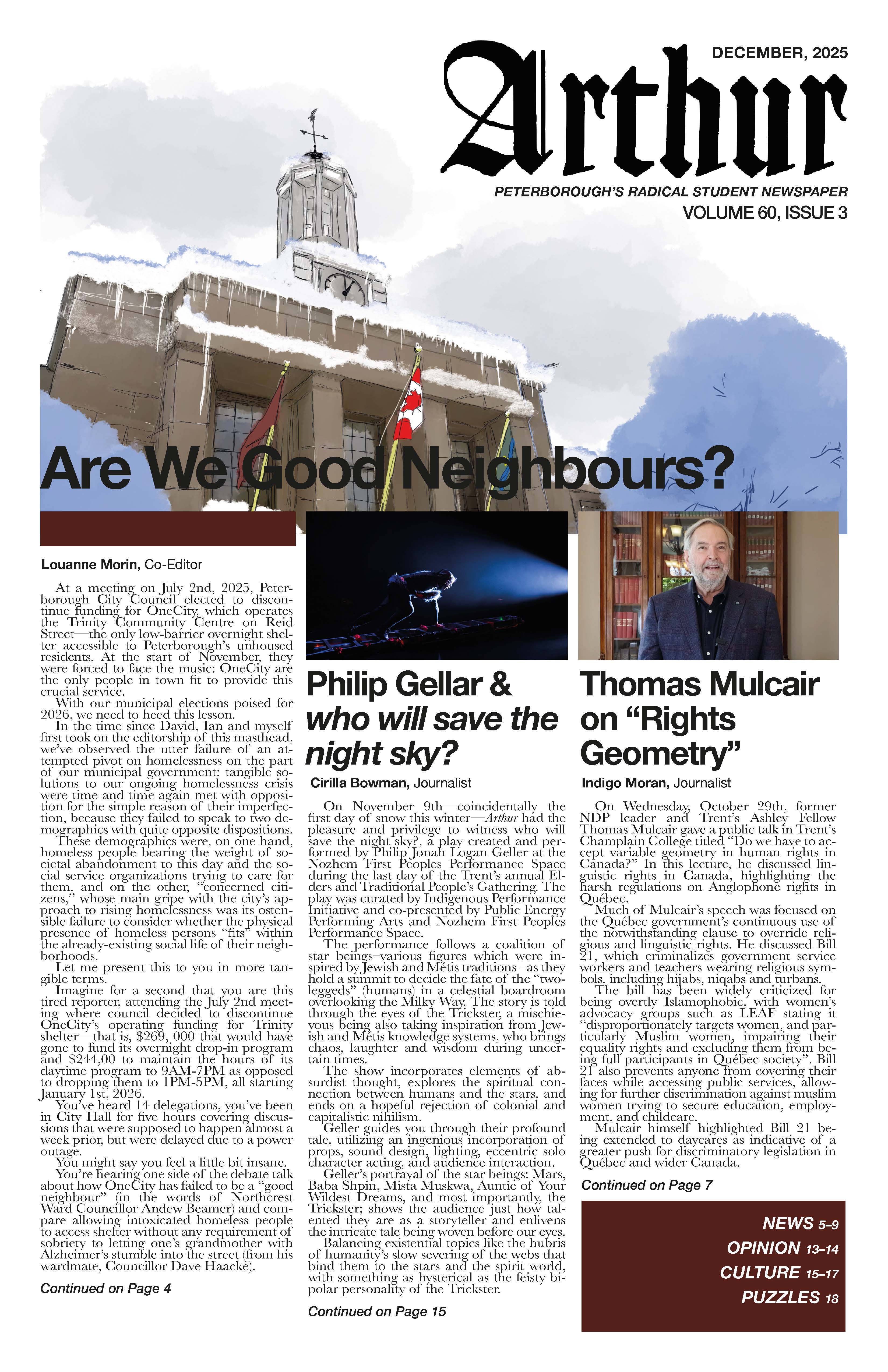A by-law meant to streamline Peterborough City Councillor portfolios has passed following a lengthy and at times heated discussion during the February 26th Council Meeting.
The new by-law, known as the Portfolio Chairs By-Law (COU24-001) established six portfolios each with two co-chair positions which will be assigned to councillors. The intention, according to Mayor Jeff Leal and City Staff, is to streamline the governance model of the City and to bring these portfolios in line with existing city departments.
However, the discussion on the by-law on Monday evening revealed a number of questions concerning the implications of its passage, especially regarding how it may hamper the City’s existing efforts to address pressing issues such as climate change as well as homelessness as both of these remain absent from the by-law as passed.
Additionally, there was concern as to what this could mean for the future of Citizen Advisory Committees in the City as section 9 of the by-law allows for co-chairs of portfolios to “dissolve advisory committees comprised of individuals other than City staff as the Portfolio Chair considers appropriate.”
This section, the City’s Legislative Services Commissioner and City Solicitor, David Potts, emphasized during debate on deferring the by-law’s passage “has nothing to do with committees, advisory committees, established by council” referring to the advisory committees established through City By-Law 22-088 otherwise known as the Advisory Committee By-Law which was passed on December 12th, 2022.
Chief Administrative Officer, Jasbir Raina also spoke to this point, reiterating the fact the by-law up for consideration “has nothing to do with advisory committees because those advisory committees were made by Council.”
“Unless the council gives direction to the staff, the status quo has to be maintained,” Raina said.
However, concern still arose earlier in the meeting for some due to the uncertainty of part b.) of a recommendation from staff which states that a report be drafted “respecting the status and roles of the City’s current advisory committees in relation to the opportunities for Portfolio Chairs to establish advisory committees.”
The questions and uncertainty voiced by Councillors prior to the interjections of Commissioners, however, would serve in some senses to underscore the arguments that Mayor Jeff Leal and Staff were proceeding to pass this by-law without fully considering the implications.
Indeed, questions which should have been clearly outlined, addressed, and set to rest during the February 20th meeting of the General Committee came back with a vengeance.
The public’s understanding of these issues had no doubt been shaped by the vagueness of the by-law itself.
Headlines such as one in kawarthaNOW (whose publisher and CEO Jeannine Taylor sits on the Arts and Culture Advisory Committee) proclaimed “Proposed by-law would give Peterborough city councillors the power to dissolve citizen advisory committees” — highlighting section 9 of the now passed by-law in a way which reflected the by-law as written on the page, but not as would be explained by City Staff during the February 26th meeting.
Unless one reached out directly to City Staff and/or Councillors for clarification on the changes to existing committees, one may be forgiven for drawing the conclusion that existing advisory committees could be unilaterally dissolved by councillors following the by-law’s passage. Significantly, as Potts and Raina would repeat, the dissolution of existing advisory committees would remain firmly in the hands of Council as a whole.
On February 17th, in an emailed statement to Arthur in response to a series of questions about the by-law, Brendan Wedley, Peterborough’s Director of Strategic Communications, wrote “there would be no change at this time” in regards to existing advisory committees.
This fact would be repeated throughout the meeting on February 26th eventually leading Mayor Jeff Leal to call concern over the threats to existing advisory committees “misinformation” and “malarky.”
A more salient aspect of this discussion among Councillors and the public is the prospect of passing the by-laws alongside the Staff recommendations without knowing for sure what the next steps would be and how they would impact existing committees. The uncertainty led some Councillors and members of the public to question the process as it unfolds piece by piece without answers from staff regarding what the next steps might entail.
Indeed, delegations and Councillors focused on the lack of consultation and clarity surrounding the by-law.
Six delegations spoke to the by-law’s implementation on Monday, including former Peterborough Mayor, Diane Therrien-Hale who voiced her understanding for the rationale behind the by-law but remained concerned about the portfolios being overly broad.
“It seems to be more of a corporate approach to streamlining the work of committees, which is problematic in municipal community contexts,” Therrien-Hale said. “The city departments are very large and each one umbrella has a diverse range of smaller branches of the municipal government, some of which are well suited to Councillor oversight, and some of which are best left without any political influence or potential political interference.”
Other delegates included Cheryl Lyon, Cam Douglas, Mark Bullock, Bill Templeman and Rob Hailman who echoed Therrien-Hale’s urging of Councillors to delay implementation of this by-law until there is greater community and council consultation on next steps and what they might entail.
Mark Burdock, who was representing the local climate and environment focused non-profit For Our Grandchildren noted that the lack of a specific climate change portfolio is especially worrisome.
“Our biggest immediate concern is that the future of the Environment and Climate Change portfolios could be put in doubt if this motion is passed,” he said. “This is a very important portfolio which needs to be preserved. It is vital that a member of Council be assigned to pay special attention to the matter of climate change, which Council described in the 2019 declaration of climate emergency as the greatest crisis of our times.”
The ways in which a City decides to organize its governance structure, Burdock noted, is intimately tied to its ability to effectively confront and respond to ongoing and immediate crises.
“We need to get a lot of things right if we’re going to win the battle against climate change — and this includes even such arcane things as effectively organizing the portfolios of municipal government,” he concluded.
On the topic of the governance model being implemented under the new by-law, Rob Hailman stated plainly that while there is a rationale for the changes to be made after remaining unchanged for nearly four decades, there had not been proper amount of consultation with the public.
“My first concern is with the model of government, or governance itself as contemplated in this bylaw — it’s a fairly wide reaching and substantial change — and as such, I think it needs a substantial case you may have for it,” he said. “I feel like that case has not been made to the public, and I don't think it was made last week in this chamber.”
“Don’t pass this by-law today, please,” Hailman continued. “I think further consultation is required: I think further consultation is required with City Staff, I think further consultation is required with Council, and further consultation is required with the citizens of Peterborough, and I think there may be opportunities to consult with experts outside of the City.”
Immediately following the delegations, Councillor Keith Riel moved for a deferral on the by-law and during his opening remarks, he made it clear that he shared the concerns of the citizens who spoke before Council that evening.
“I believe we must strive for a process that embraces consultation and collaboration,” Riel stated. “Let us work together to ensure that governance reflects the values of democracy, inclusiveness and transparency for the City of Peterborough.”
Turning directly to the by-law itself, Riel stated that “municipal government is the last bastion of democracy. I don't answer to a political party. I don't answer to a political leader. I answered the people that elected me to do the job — and that's the constituents of the City of Peterborough.”
Following reading his prepared statement into the record, Riel continued in an impassioned direct address to Councillors and staff.
“If you don't see this as an affront to democracy, there's something extremely wrong — absolutely wrong with you,” he said. “When I read this here, this flies in the face of exactly what we're supposed to do. And that is to do the job of City Councillor for the taxpayers that are sitting out here. Get with the program here!”
Councillor Alex Bierk also spoke in support of a deferral on the by-law, noting how unclear the process moving forward would be and how it impacts Council and the City’s ability to make informed decisions moving forward.
“The bylaw is setting a precedent for our future without offering a clear path and vision of what that future is,” Bierk said.
“We find ourselves navigating in the dark, especially concerning critical areas such as transit, heritage, DEI, accessibility, economic development, and the urgent matters of the environment and climate change. The feedback from our constituents through emails, calls and direct interactions resonates with these applications. Senior leadership and the CAO strategize about our roles yet notably, these conversations have not included us,” he went on to note, re-affirming his and his fellow Councillor’s belief that Councillors had not been adequately kept apprised of the development of this by-law.
The deferral would go on to be defeated narrowly by a vote of 6-5. Councillor Kevin Duguay, who voted against deferring the vote on the by-law due to agreement with Major Leal that it “reflects a modern Council with modern administration.”
“I might also say that I view the bylaw as providing an opportunity to strengthen our working relationships on a Portfolio basis with City Commissioners,” Duguay said.
Following the unsuccessful attempt at a deferral, the staff’s recommendation was adopted by a vote of 7-4 with Councillors Lachica, Bierk, Riel, and Parnell voting against and the by-law later adopted by a vote of 8-3 with Parnell voting with the majority.


.png)


.jpg)


.jpeg)



.jpg)


.jpg)

.jpg)


.jpg)
.jpg)



.png)